Lição 14 - Conditional Statements
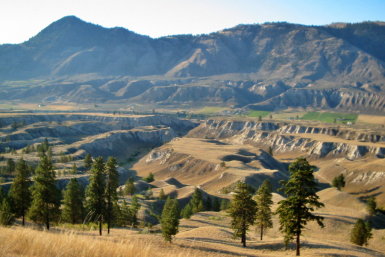
In this lesson you'll learn how to use conditional sentences in English. You'll also learn how to use verb phrases to be supposed to and used to.
In the vocabulary section, you'll learn the English words for objects that are found in nature.
This lesson starts with a short conversation between two people who are discussing their plans for the weekend.
Anúncio
Conversações
English
Mark and Alice see each other as they are leaving from work on Friday. They discuss their plans for the weekend.
Mark: What are you up to this weekend?
Alice: I'm going to the beach on Saturday with some friends, then we're going for dinner, and after that we're going to a concert. I don't have any plans for Sunday yet. What are you doing this weekend?
Mark: I'm going to go hiking to Kennedy Lake in the mountains.
Alice: That's a long hike, but it's worth it. It's a beautiful lake. What are you doing on Sunday? Do you want to go for a coffee?
Mark: Sure. How about we meet at Wick's Café at 11.
Alice: Sounds good. I'll see you there.
Português
Mark e Alice se veem quando saem do trabalho na sexta-feira. Eles discutem seus planos para o fim de semana.
Mark: O que você está fazendo neste fim de semana?
Alice: Vou à praia no sábado com uns amigos, depois vamos jantar e depois vamos a um concerto. Ainda não tenho planos para domingo. O que estão fazendo neste fim de semana?
Mark: Vou fazer uma caminhada até o Lago Kennedy nas montanhas.
Alice: É uma longa caminhada, mas vale a pena. É um belo lago. O que você está fazendo no domingo? Você quer ir tomar um café?
Mark: Com certeza. Que tal nos encontrarmos no Wick's Café às 11.
Alice: Boa ideia. Eu te vejo lá.
Natural Objects
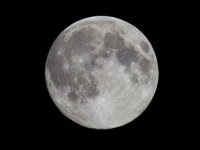
 moon
moon
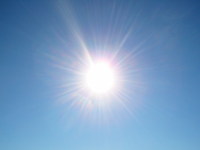
 sun
sun

 stars
stars

 Earth
Earth

 mountain
mountain

 cliff
cliff

 hill
hill
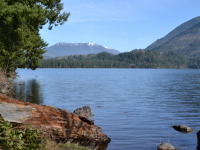
 lake
lake
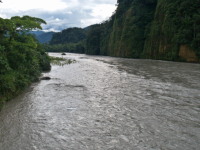
 river
river
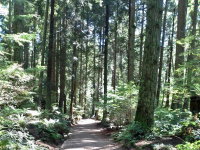
 forest
forest

 desert
desert
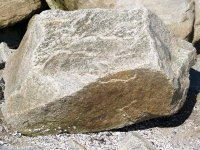
 rock
rock
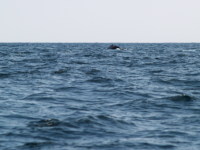
 ocean
ocean
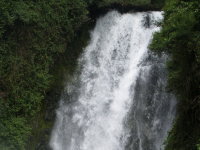
 waterfall
waterfall

 lightning
lightning

 cloud
cloud
Gramática
Conditional Sentences
A conditional sentence contains a statement that will be true if a certain condition or conditions happen. Conditional sentences are often formed using a group of verbs in English called modal verbs (will, shall, can, may, and must), usually along with the conjuction if. Conditional statements can be simple present, simple past, or past perfect.
Present Conditional
The simple present conditional is used to talk about things that happen when cetain conditions are met. The present tense of verbs or the present tense of a modal verb plus infinitive are used in these sentences.
Examples
| If I open the door, the cat runs outside. | Se eu abrir a porta, o gato corre para fora. |
| If I open the door, the cat will run outside. | Se eu abrir a porta, o gato vai correr para fora |
| If I open the door, the cat can run outside. | Se eu abrir a porta, o gato pode correr para fora. |
| If I open the door, the cat may run outside. | Se eu abrir a porta, o gato pode correr para fora. |
| The cat will run outside if I open the door. | O gato correrá para fora se eu abrir a porta. |
| The cat will run outside if I open the door and say his name. | O gato correrá para fora se eu abrir a porta e disser o seu nome. |
| The phone will break if I drop it or throw it. | O telefone irá partir-se se eu o deixar cair ou atirar. |
Simple Past Conditional
The simple past conditional is used to refer to an imaginary or unreal event and its probable result. For the simple past conditional, would, which is the past tense of will, is used.
Examples
| I would agree with you if you were right. | Eu concordaria consigo se estivesse certo. |
| The cat would go outside if I opened the door. | O gato iria lá fora se eu abrisse a porta. |
| I would read the book if I had more time. | Eu leria o livro se tivesse mais tempo. |
| I would read the book if it was interesting and I had more time. | Eu lia o livro se fosse interessante e tivesse mais tempo. |
| I would read the book if it was interesting or I had more time. | Eu lia o livro se fosse interessante ou se tivesse mais tempo. |
| Snow would be great if it wasn't cold. | A neve seria óptima se não estivesse fria. |
Conditional Perfect
The past conditional perfect is used to indicate that a different action in the past would cause a different outcome than what actually happened. The conditional perfect is formed using would have with the past participle of the verb.
Examples
| We would have gone if we had enough money. | Teríamos ido se tivéssemos dinheiro suficiente. |
| The cat would have gone outside if I had opened the door. | O gato teria ido lá para fora se eu tivesse aberto a porta. |
| I would have walked to the store if it wasn't raining. | Eu teria ido a pé até à loja se não estivesse a chover. |
| Would they have done the dishes if I had asked them? | Teriam eles lavado a loiça se eu lhes tivesse pedido? |
| I would not have offered if I didn't mean it. | Eu não teria oferecido se não o quisesse dizer. |
| The snow would not have melted if it was a bit colder. | A neve não teria derretido se estivesse um pouco mais fria. |
To Be Supposed To
The verb phrase to be supposed to means that an action is expected or believed to be done by somebody.
Examples
| Mary is supposed to study for her exam. | Maria é suposto estudar para o seu exame. |
| We are supposed to paint the house today. | Devemos pintar a casa hoje. |
| You are not supposed to tell anyone. | Você não deve contar a ninguém. |
| Am I supposed to do it? | Devo eu fazê-lo? |
| You were supposed to do it. | Você era suposto fazê-lo. |
| The teacher was supposed to explain it to us. | O professor deveria ter-nos explicado isso. |
Used To
Used to has several different meanings. This section covers each of its uses.
1) To be used to means to be accustomed to, or to be familiar with. For example:
| I am used to the warm weather. | Estou habituado com o tempo quente. |
| I’m used to leaving work late. | Estou habituado a sair tarde do trabalho. |
| He is used to the noise of the traffic. | Ele está habituado ao ruído do trânsito. |
2) When used to follows a noun or pronoun it means an action was repeated in the past, but does not currently happen. For example:
| I used to drive to work, but now I walk to work. | Eu costumava conduzir para o trabalho, mas agora vou a pé para o trabalho. |
| I used to put two teaspoons of sugar in my coffee, but now I don’t put any sugar in. | Costumava pôr duas colheres de chá de açúcar no meu café, mas agora não ponho nenhum açúcar. |
| They used to visit almost every weekend, but now that they’ve moved away, we rarely ever see them. | Costumavam visitá-los quase todos os fins-de-semana, mas agora que se mudaram, raramente os vemos. |
3) Used to can also be the past tense of the verb phrase use to. For example:
| What did you use to fix it? I used a hammer to fix it. | O que utilizou para o reparar? Usei um martelo para o consertar. |
| What do they use the apples for? They use them to make apple pie. | Para que é que utilizam as maçãs? Utilizam-nas para fazer tarte de maçã. |
| We used it to store our extra clothes. | Utilizámo-lo para guardar a nossa roupa extra. |
Flashcards
Use os flashcards online para ajudá-lo a aprender o vocabulário nesta lição.
Exame
Aqui está um breve exame para ajudá-lo a aprender o vocabulário de inglês incluído nesta lição.

